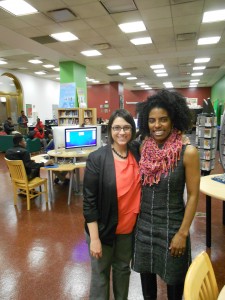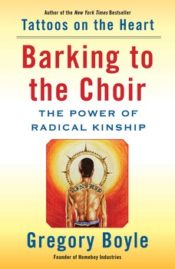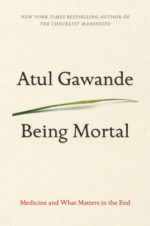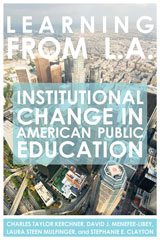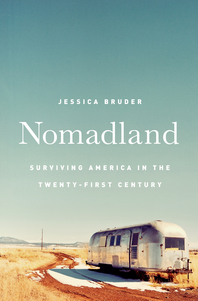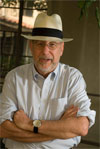Chicago Library Provides Example of High-Tech and High Touch. Is L.A. Ready For This?
Posted on | December 18, 2013 | Comments Off on Chicago Library Provides Example of High-Tech and High Touch. Is L.A. Ready For This?
Brandon Towns was having trouble opening his MacBook to show me the movie he’d made because his fingers were sticky with the glue he was using to make a paper maché mask.
Both sticky fingers and the Macbook capture the essence of YouMedia, the 5,500 square foot space in the Chicago Public Library where Towns and I met. It’s a high-tech and high touch place for engaging and motivating students, trying to get them sticky with learning.
For the MacArthur Foundation, which funded YouMedia, and for a growing group of educators, the space is a physical representation of a more profound form of learning than that represented by the current teach-and-test regime.
As Connie Yowell, director of education at the foundation, says: “We really think that part of what’s wrong with the current education system, and why people talk about it as broken, is that it is fundamentally starting with the wrong question. The education system now often starts with the question of outcomes: what do we want kids to learn?…. Our core question is ‘what’s the experience we want kids to have?’ So, the core question is around engagement.”
For Towns, and an estimated 300-500 students a week, YouMedia represents a safe place to go after school: somewhere to hang out, mess around, and to geek out. These terms were coined by Mimi Ito and her collaborators in their book about how kids engage digital media. The physical layout of YouMedia was designed with spaces that invite each activity.
Comfortable chairs and couches occupy the space near the door watched over by a friendly security guard. Eight teen-age girls crowd the conversation nook. Further down the room, students worked at tables and computers. Five young men crowded into the soundproof recording booth. At the end of the room, Towns sat huddled with his mentors, working on the mask that will be incorporated into his next film.
Towns is geeking out. He is part of the 22 percent of YouMedia users who come together with the adult staff to create something or connect youthful interest with academic learning. A student at King College Prep Academy, a Chicago Public Schools magnet, Towns has been making movies since he was 10. “The Struggle is Real” is a two-minute reminder that food insecurity dogs the lives of many Americans. And here is the trailer for his upcoming film featuring the mask he made.
Towns and the other visitors to the library get to use good stuff for free. For a young man who scrimped to buy his own camera, the range of available equipment and services helps level the economic playing field a bit. New model computers sit on desks. Students can check out laptops and video cameras for use in the space. They can create in one of the recording studios, print the art they have created, or experiment with a 3-D printer. There are also hundreds of books. The librarians found that when they moved the teen collection into the YouMedia space, circulation for old-fashioned “dead tree” media increased 400 percent.
Most Teens Make A Special Trip
The YouMedia space is a magnet. Some of the students come on their way from school, but most make a special trip to Chicago’s central Harold Washington Library, located at the edge of the “Loop” where the elevated and subway lines converge and circle downtown. About half live more than five miles from the library, a study by the Consortium for Chicago School Research reports. African American males stand out as the largest of a diverse set of YouMedia users. Some 88 percent of users go to Chicago Public Schools, and they are relatively successful: 35 percent of them attend selective schools, which account for only about 10 percent of the district’s high school enrollment.
In the study, written by Penny Bender Sebring and colleagues, students report that they like the space and see it as safe and welcoming. Particularly among the most active users, students say that YouMedia has helped them with academic skills, especially communicating with adults, writing, and understanding opportunities that are available to them after high school.
Like Towns and his mentors Carolina Gonzalez and Sean Owens, students surveyed said that they had created a personal relationship with at least one adult. Significantly, these adults not only help students learn skills, they help them connect with other adults and open their minds to career and learning possibilities.
YouMedia is spreading. Four Chicago branch libraries have instillations, 24 learning laboratories have been established around the country. Adrienne Strock, a Chicago Public Library staff member who manages the space, writes that two of them are in California: at the Lawrence Hall of Science in Berkeley and at the San Francisco Public Library. There are also experiments with temporary, “pop-up” instillations in schools and shopping centers.
Moving social and learning connections out of physical space and into virtual space is an important aspect of the experiment. YouMedia Online is a closed social network, where uninvited adults and youth can’t lurk. Central to them is the intersection of individual interests, peer culture among teenagers, and academic content. Seventy-four percent of the YouMedia space users have a high-speed Internet connection at home, a number nearly identical to that of Chicago Public Schools students at large.
Does all of this work perfectly? Of course not. YouMedia is a laboratory, a test bed for a set of ideas that MacArthur calls Connected Learning. The Digital Media and Learning Hub at the University of California, Irving, synthesized connected learning from the experience of MacArthur grantees and researchers. (Connected Learning is not substantially different from the ideas that I call Learning 2.0.)
The connection with academic content does not come easily. The pull to YouMedia’s library space is as much that of teen friends as it is access to technology. Teens choose how deeply to get involved. The adults try to design activities that attract teens to workshops and projects that deepen their skills, but they are not always successful. As the study notes, “Staff must cajole and persuade in order to attract teens to the workshops and projects where they can build their skills and deepen their expertise. Staff members have found it particularly difficult to encourage novice youth to develop the skills they need to take advantage of the high-profile events that are available to teens with more advanced skill levels.”
Like a YMCA or other community center, YouMedia is a combination of unstructured space (the lounge or open basketball court) and structured space (classes or programs with expected participation and attendance). However, at YouMedia, structured and unstructured activities take place next to each other in the same large, open room. Youth can move fluidly between levels of activity. This provides a splendid laboratory that can peer into teen imagination, but doesn’t have the lock-in expectation of attendance of more a traditional class or workshop.
‘It can be frustrating’
One mentor quoted in the study said: “It can be frustrating when you think you’ve got a really great idea for a program, and then no teenagers show up. And it happens a lot. And it’s always a challenge because you can develop something and have kids say they’re gonna come, but because we’re a voluntary space, there’s no penalty for being absent. So that can be hard and frustrating and somewhat disheartening. Sometimes, you want to do really big projects, and it just can’t come together.”
As a solution, YouMedia is trying to link students to project-based learning opportunities offered outside the library by other organizations. Projects and short duration theme-based workshops seem more successful in retaining teen’s participation, but it is difficult to use them to teach introductory skills or attract novices.
The digital equipment presents another issue. One YouMedia staff member remarked in the study, “Teenagers break stuff really quickly. Really, really quickly. And it is a big concern on how often we can replace the equipment.” There is real tension between giving teens freedom to cultivate interest and requiring that they know how to properly use and care for equipment. Youth must pass a certification requirement before using the recording studio, but access to other equipment is much less restricted.
YouMedia online is a work in progress. The network is closed in the sense that teens must register to use it. In its first iteration, it was thought that it would be a social network for YouMedia users, but it did not work that way. Teens preferred other platforms where they could interact with all their friends, not just those who were associated with the library project. “Facebook has the larger pull,” one said. There were also technical problems making it hard to connect to the site.
However, the site was useful as a way for students to interact with teacher mentors and to get feedback on projects.
There is bubbling in the pot at YouMedia and with the network of organizations that intersect with it. That’s what makes the whole process fascinating. Already, the web of interactions links the library and its activities with the Chicago Summer of Learning (see earlier post). The summer project is likely headed to Los Angeles. And that in the words of Sybil Madison Boyd, program director at the Digital Youth Network, is a B-F-D, a big fantastic deal. That gives one reason to consider how the YouMedia library and learning labs might migrate westward, too.
Revised 12/28/13
Tags: Atrienne Strock > Brandon Towns > Chicago Public Library > Connected Learning > Connie Yowell > MacArthur Foundation > Sybil Madison-Boyd
